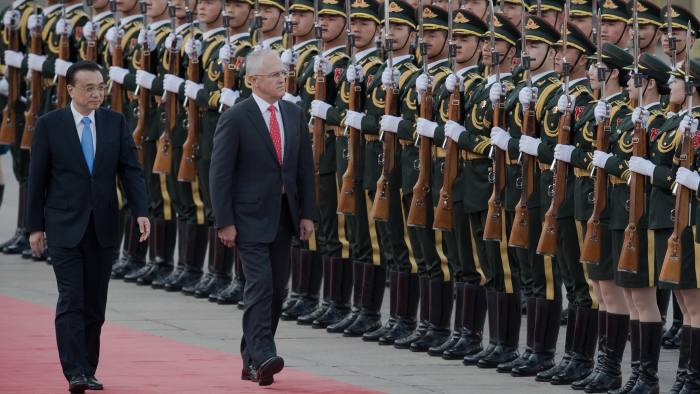By Jamie Smyth in Sydney

Australian Prime Minister Malcolm Turnbull reviews a military honour guard with Chinese Premier Li Keqiang in Beijing last year.
Australia has rejected a Chinese push for a formal alignment of Canberra’s A$5bn state infrastructure fund with Beijing’s New Silk Road strategy, over concerns it could damage relations with the US at a time when it is asking Washington to do more in the region.
The Chinese initiative, also known as One Belt One Road, envisages investing $4tn in port, road and rail projects overseas — and Beijing has been pressing Asia-Pacific economies to sign up to its vision.
But Canberra has confirmed there will be no agreement over Australia’s Northern Development Infrastructure Facility during a trip to Australia this week by Li Keqiang.
“No formal memorandum on this issue will be signed during the visit,” said one Australian official speaking on condition of anonymity.
Li’s trip comes at a tricky time in Sino-Australian relations.
Canberra is pressing Washington to bolster its presence in the region and taking a tougher line on inward investment from China, recently blocking two high-profile takeovers.
Last week Julie Bishop, Australia’s foreign minister, called on the administration of Donald Trump to expand the US role in Asia to ensure stability and peace.
“While non-democracies such as China can thrive when participating in the present system, an essential pillar of our preferred order is democratic community,” she said in a speech in Singapore.
The debate over whether Australia should align its state infrastructure fund with One Belt One Road bears similarities to Canberra’s hesitation over joining the Asian Infrastructure Investment Bank.
In 2014 Australia initially decided not to join the Chinese-led multilateral lender following lobbying by the US and Japan.
But when the UK and several other western nations broke ranks and signed up to the AIIB, Canberra joined them.
“There is a view in the defence/security community in Canberra that initiatives like the AIIB and One Belt One Road are a way to extend Chinese influence at the expense of the US,” said Geoff Raby, a former Australian ambassador to China, who runs a consultancy advising Chinese and Australian businesses.
Li Keqiang’s Australian agenda
● Beijing is pressing Canberra to ratify an extradition treaty that would enable it to target corrupt officials that have fled to Australia following Xi Jinping’s crackdown on corruption at home.
● Canberra is likely to raise the cases of 14 employees of Crown Resorts — the gaming company controlled by Australian billionaire James Packer — who remain in detention in China following their arrest in October.
● Both countries are working to tackle technical issues that have hampered the free flow of goods between the two. Australian beef producers are seeking greater access to the Chinese market.
Mr Raby said Australia-China relations had “gone adrift”, with Canberra increasingly taking an idealist approach to relations focused on values, rather than a more greedy approach aimed at boosting economic ties with its largest trading partner.
Australian companies have expressed an interest in getting involved in the New Silk Road plan and business leaders in the country have set up a One Belt One Road advisory group to facilitate this. Government officials in the Northern Territory have also sought to align the region with China’s plans, describing official Chinese overtures first made by Xi Jinping on a visit to Australia in 2014 as a great opportunity for Darwin as a hub servicing the New Silk Road.
But Chinese assertiveness in the South China Sea, where it has laid claim to a vital trade route and lucrative fisheries area, has made Australia wary of its regional ambitions.
Canberra recently tightened scrutiny of foreign takeovers following the purchase of Darwin port by the Chinese company Landbridge — a transaction that alarmed Washington because of the nearby presence of a US army base.
Hugh White, professor of strategic studies at Australian National University, said Australia did not want to be left out of the Asian infrastructure network promised by One Belt One Road but nor did it want to be seen to be jumping on Beijing’s bandwagon too enthusiastically.
“Like everything else in Asia these days, OBOR has become a political and strategic symbol in the great contest between Washington and Beijing for regional leadership,” he said.
Shi Yinhong, professor of international relations at Remin University in Beijing, said port investments were by far the most sensitive direct investment by China in Australia.
“Obviously, there is a security concern over the ports,” he said.
“And on the Maritime Silk Road project, Australia has been hesitant because of a fundamental disagreement over the South China Sea.”
Aucun commentaire:
Enregistrer un commentaire